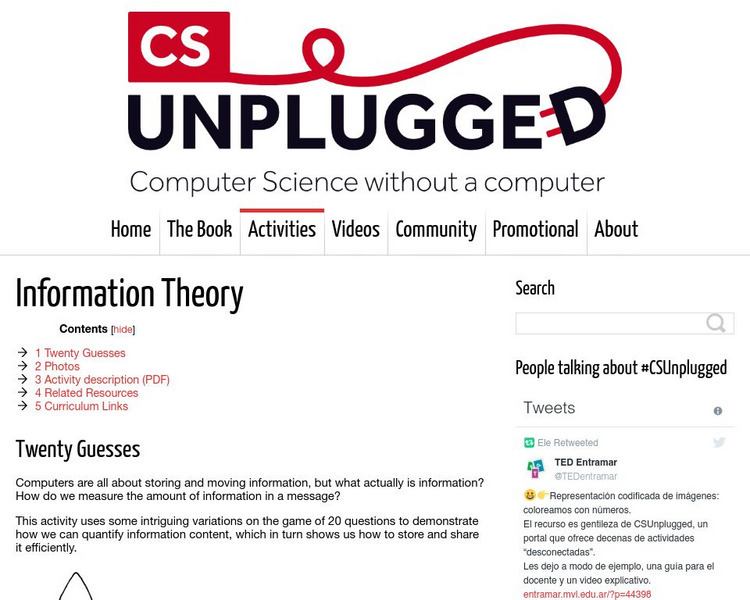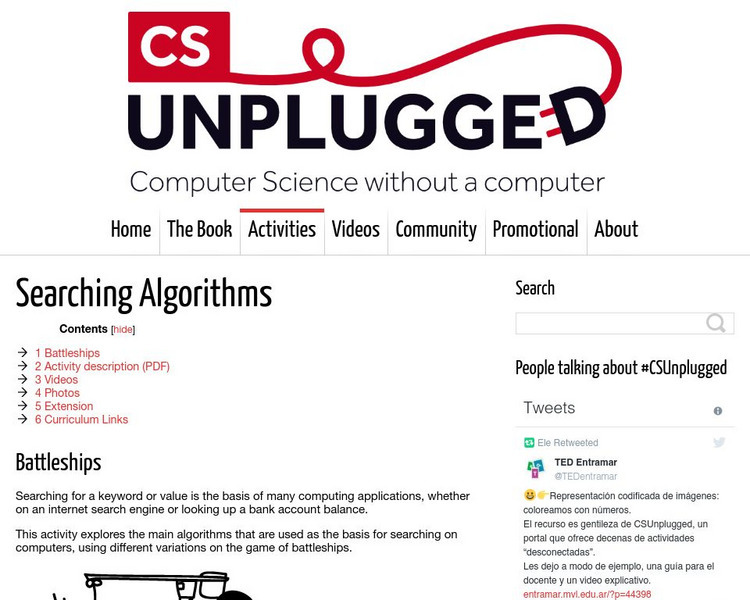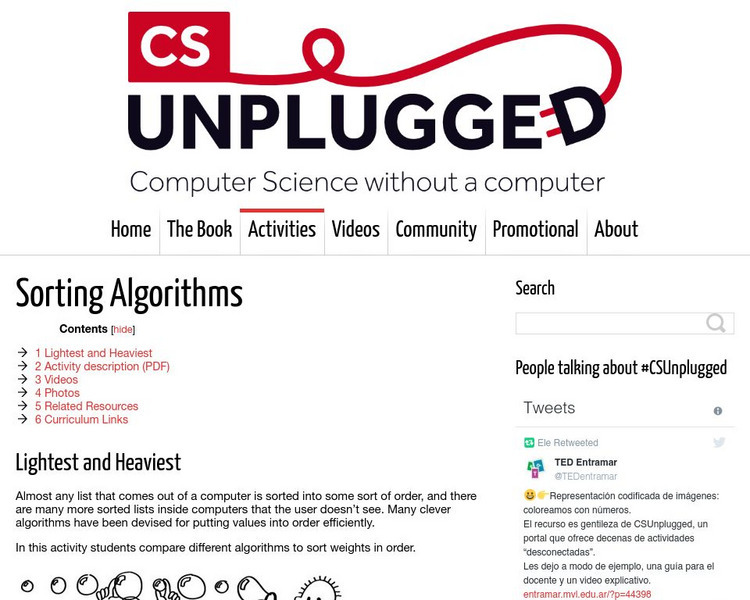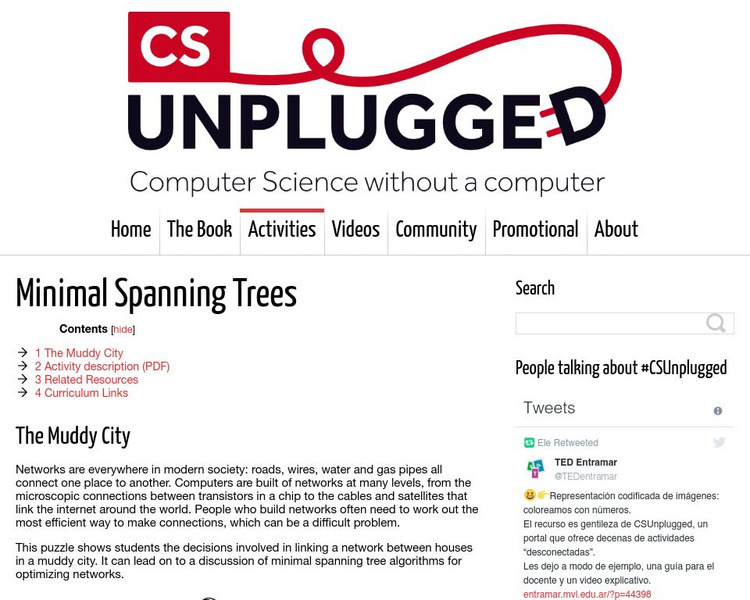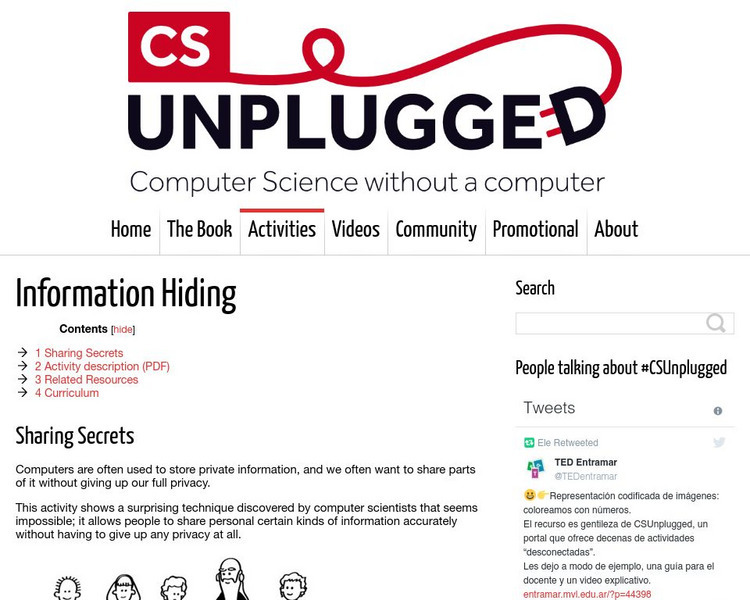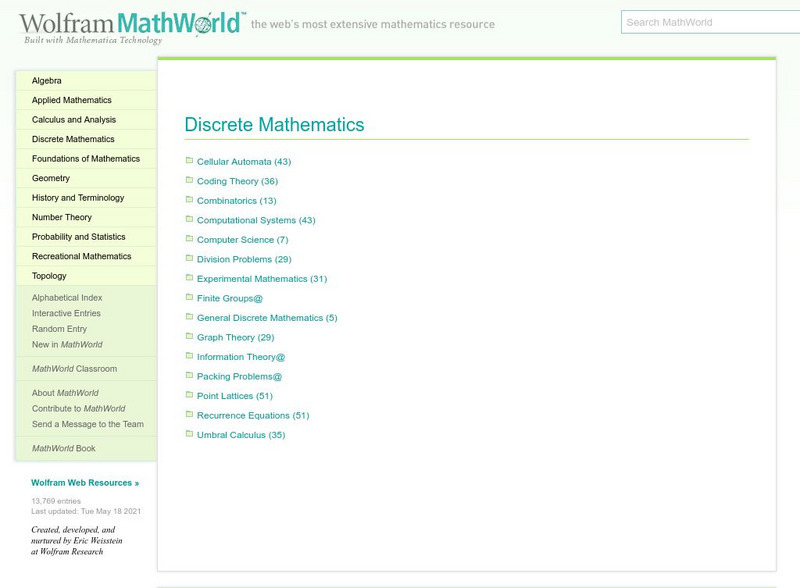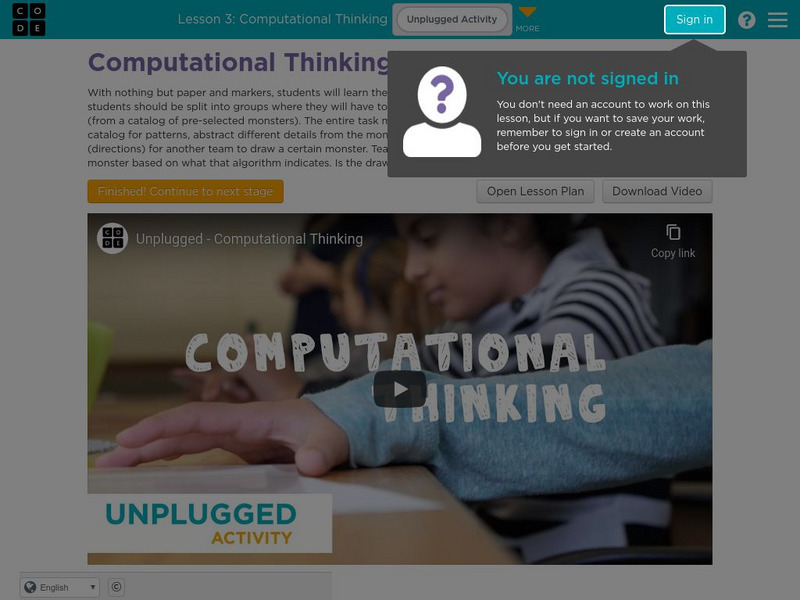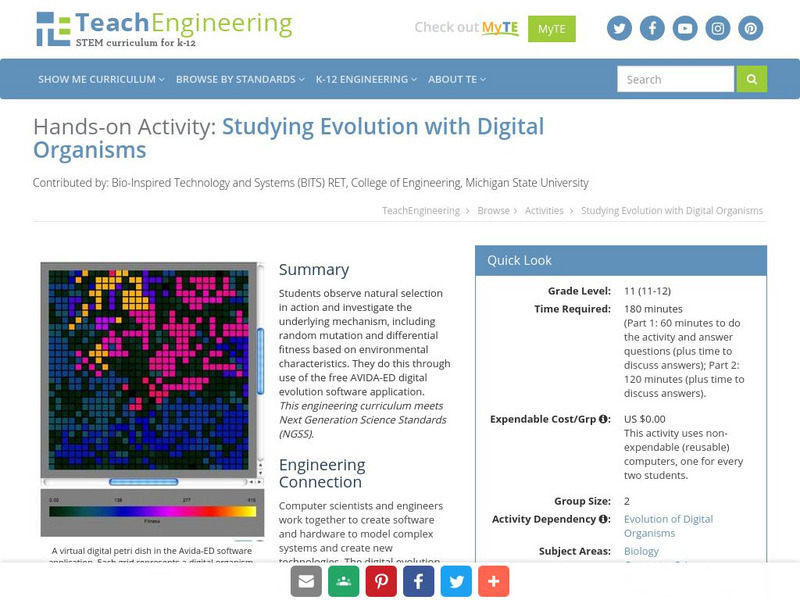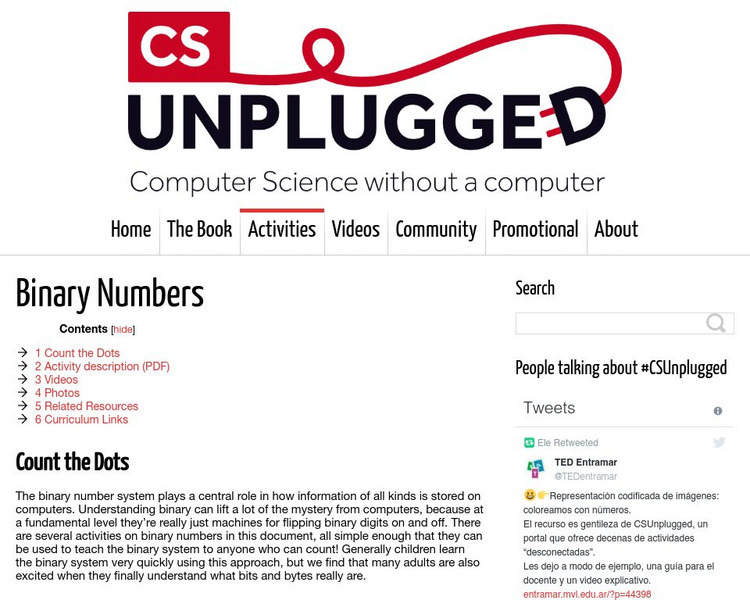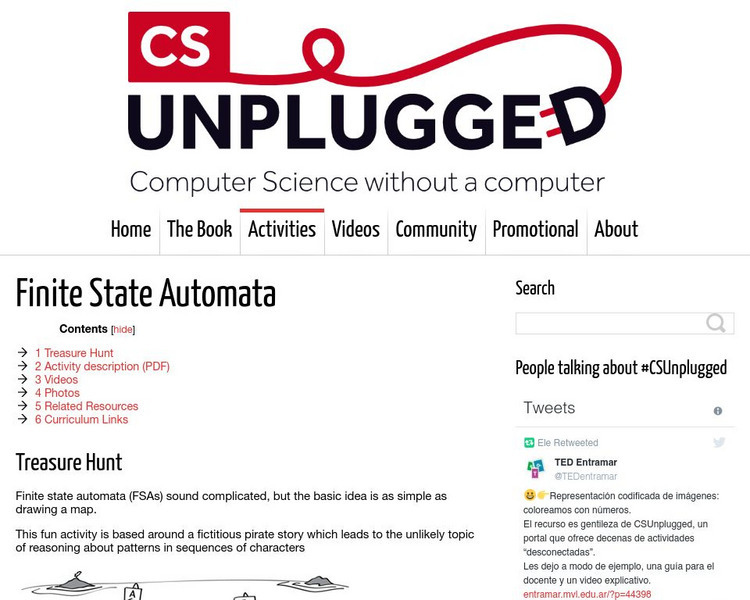Other
Code Combat
This computer programming game allows students to learn how to write code. Learners write code in real programming languages.
National Women’s History Museum
National Women's History Museum: Getting With the Program
American women's contributions to the invention and formation of computer programing.
Other
Robotc: Thinking About Programming: Programmer & Machine [Pdf]
In this lesson, students learn about the roles of the programmer and the robot, and how the two need to work together in order to accomplish their goal. Students also understand logic behind the robot's actions, and break a big plan down...
Other
Codecademy
Codecademy is a creation designed to educate users in writing code, using JavaScript, HTML/CSS, Python, and other programs. Review tutorials, create web designs, interactives, and apps, and collaborate or share with the Codecademy...
TeachEngineering
Teach Engineering: Curiosity Killed the App
Students gain experience with the software/system design process, closely related to the engineering design process, to solve a problem. First, they learn about the Mars Curiosity rover and its mission, including the difficulties that...
University of Canterbury
University of Canterbury: Cs Unplugged: Information Theory
This activity uses variations on the game of 20 Questions to demonstrate how we can quantify information content, which in turn shows us how to store and share it efficiently when it comes to computer technology.
University of Canterbury
University of Canterbury: Cs Unplugged: Searching Algorithms
Explore the main algorithms that are used as the basis for keyword searching on computers, using different variations on the game of battleships.
University of Canterbury
University of Canterbury: Cs Unplugged: Sorting Algorithms
Many clever algorithms have been devised for sorting values into order efficiently. In this activity students compare different algorithms to sort weights to simulate how computers devise sorted lists.
University of Canterbury
University of Canterbury: Cs Unplugged: Minimal Spanning Trees
This puzzle shows students the decisions involved in linking a network between houses in a muddy city. It can lead on to a discussion of minimal spanning tree algorithms for optimizing networks.
University of Canterbury
University of Canterbury: Cs Unplugged: Programming Languages
Help build the foundation of understanding computer languages with this activity. Demonstrate some of the issues that arise when we try to give precise instructions to achieve a desired outcome.
University of Canterbury
University of Canterbury: Cs Unplugged: Information Hiding
This surprising technique discovered by computer scientists that seems impossible allows people to share personal certain kinds of information accurately without having to give up any privacy at all.
University of Canterbury
University of Canterbury: Cs Unplugged: Human Interface Design
This activity explores just how hard it is to get things right when it comes to designing good interfaces for computers.
Northwestern University
Northwestern University: Ct Stem Project: Computational Thinking: Lessons
Northwestern University frames lessons which bring computational thinking enhanced activities into STEM classrooms.
Wolfram Research
Wolfram Math World: Discrete Mathematics Topics List
A thorough list of topics in the study of Discrete Mathematics. Combinatorics, Graph Theory, and Point Lattices are three of the many areas given in-depth explanations here. Many of the links contain discussions of the topics that both...
Other
Iste: Computational Thinking for All
Advances in computing have expanded our capacity to solve problems at a scale never before imagined, using strategies that have not been available to us before. This professional article introduces educators to the idea of teaching...
Other
Programming Simplified: Java Programs
See some examples made for beginning programmers to understand how to use java to write simple Java programs. These codes demonstrate how to get input from user, working with loops, strings and arrays.
Code.org
Code Studio: Computational Thinking
Introduce the Computational Thinking model as a way of preparing real-world problems for digital representation. With nothing but paper and markers, students learn the four steps of computational thinking.
TeachEngineering
Teach Engineering: Studying Evolution With Digital Organisms
Students observe natural selection in action and investigate the underlying mechanism, including random mutation and differential fitness based on environmental characteristics. They do this through use of the free AVIDA-ED digital...
TeachEngineering
Teach Engineering: Evolution of Digital Organisms
Young scholars are introduced to the concepts of digital organisms and digital evolution. They learn about the research that digital evolution software makes possible, and compare and contrast it with biological evolution.
University of Canterbury
University of Canterbury: Cs Unplugged: Binary Numbers
With this lesson plan, educators can teach the binary system to anyone who can count. Using this approach, many adults are also excited when they finally understand what bits and bytes really are.
University of Canterbury
University of Canterbury; Cs Unplugged: Text Compression
Learn how compressed formats such as zip, gzip, or gif images are all based on a method called Ziv-Lempel coding, which turns out to be an interesting exercise in finding patterns in text.
University of Canterbury
University of Canterbury: Cs Unplugged: Sorting Networks
A student team activity that demonstrates an approach to parallel sorting, or how much computation can be done at the same time. It can be done on paper, but the lesson becomes more meaningful if the students do it on a large scale,...
University of Canterbury
University of Canterbury: Cs Unpluggeed: Network Protocols
Students learn what information makes up a protocol for bits of information added to messages to make sure they are sent over the internet.
University of Canterbury
University of Canterbury: Cs Unplugged: Finite State Automata
This student activity is based around a fictitious pirate story which leads to the unlikely topic of reasoning about patterns in sequences of characters. Experiencing this concretely will help lay the foundation for understanding finite...
Other popular searches
- Computer Science Excel
- Computer Science Java
- B Ed Computer Science
- History of Computer Science
- Computer Science History
- Computer Science Worksheets
- Networking Computer Science
- Computer Science C Programs
- Computer Science C++programs
- Computer Science Engineering
- Science and Computer Science
- Computer Science Terms




